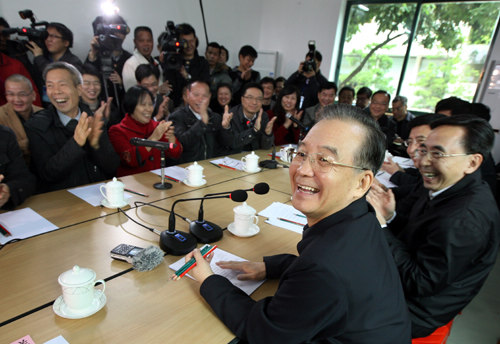Protecting Farmers' Rights
Beijing Review, February 29, 2012 Adjust font size:
 |
|
Chinese Premier Wen Jiabao talks with famers from Shuili and neighboring villages in Guangzhou, south China's Guangdong Province, on February 4. |
The village has a total area of 638 hectares, of which 88 hectares are arable land.
In one case, residents requested the return of 30 hectares of farmland that was bought and developed by a company jointly owned by the villagers' committee and a Hong Kong company.
The sale of the land, which was actually 4 hectares larger than the approved area, was not disclosed to residents.
In response to the villagers' request, the Lufeng City Government annulled the land transaction, and returned the land to local villagers for farming. The Hong Kong-based developer would receive some compensation, said local government sources.
Investigators accused some village officials, including Xue Chang, former Party chief of Wukan, and Chen Shunyi, former head of the Wukan Villagers' Committee, of embezzling public assets and accepting bribes during the sale of farmland. For example, Xue allegedly embezzled public funds to purchase a car worth 200,000 yuan ($31,746) for personal use in July 2010.
Provincial officials also announced that the villagers' committee election in Wukan in February 2011 was invalid and new elections were to be organized.
The previous election drew complaints from villagers, who complained that a list of candidates was never published and that some of the candidates were also election organizers, both of which go against laws and local regulations on villagers' committee elections.
On January 15, a new Party branch and a work team were set up in Wukan to prepare for the upcoming re-election of the villagers' committee.
Solutions
In recent years, China has seen a surge of protests, particularly in the country's wealthy coastal rural areas, which are sparked by issues from pollution to land seizures. Local authorities have been urged to change their modes of governance in order to effectively address public complaints.
Guo Weiqing, a professor at the Sun Yat-Sen University in Guangzhou, capital of Guangdong Province, said that China's recent economic and social changes have created a number of social problems, which make eruptions of public anger more likely.
"Local governments often respond to crises and demonstrations inappropriately. They often attempt cover-ups and try to suppress demonstrations. But improper measures may turn what begins as a peaceful airing of grievances into a violent confrontation," Guo said.
In 2010 alone, there were around 180,000 protests and other mass incidents in China, three times the number reported in 2003, according to Sun Liping, a professor of sociology at Tsinghua University.
Although official statistics for 2011 were unavailable, most people believe the number of mass incidents increased last year.
Because of these increasing tensions, the Central Government has begun paying more attention to farmers' issues.
On February 1 a policy document was jointly issued by the CPC Central Committee and the State Council, China's cabinet. It says the government will accelerate revisions of relevant laws to improve its policies regarding rural land.
"The transfer of land use rights must be voluntary, fully compensated and conducted in accordance with the law," the document says.
Local authorities are required to step up the registration of rural land ownership and steadily carry out pilot programs to reform land contracts in rural areas. Meanwhile, the document pledges greater efforts to improve the rules governing conciliation and arbitration with regard to land disputes.
On a visit to Shuili Village in Guangzhou on February 4, Premier Wen Jiabao called for more efforts to ensure farmers' land rights.
Unauthorized expropriation of farmland has been a common problem, causing many complaints and even mass disturbances, Wen said.
The premier also highlighted the need to ensure farmers' voting rights and the direct election of village-level leadership in a fair and transparent manner, which he labeled a crucial task for local authorities.
Wen said self-governance is the only appropriate means to improve the administration of rural communities and local affairs should be decided by local villagers.
At the annual central conference on rural work in December 2011, Wen said that China should strive to promote agricultural modernization and protect farmers' rights to boost the development of rural areas.
"No one is empowered to deprive farmers of their rights," Wen said, adding that any failure in agriculture would hamper the country's economic development and social stability.


